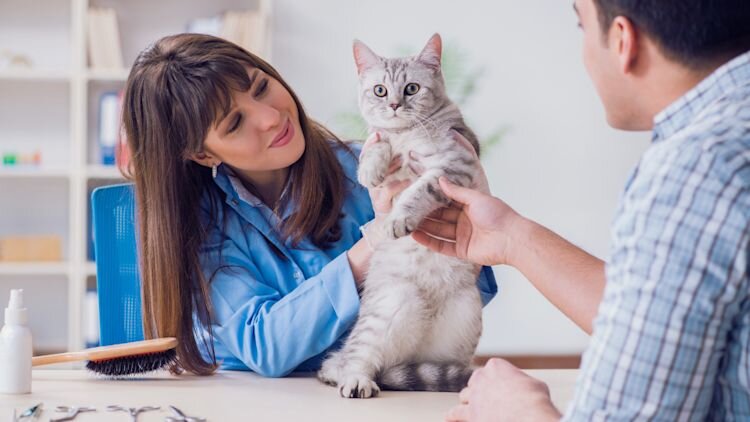What Is Preventive Care & Why Does My Pet Need It?
Associate Veterinarian, Speaker, Author - Penn-Ohio Veterinary Services and KMB Veterinary Media LLC
When your pet is sick, many things might go through your mind: Will my pet be okay? How much will this cost to treat? Can I afford it? One of the hardest questions to consider is, Could this have been prevented?
In some cases, the disease process is age-related or out of the owner’s hands, but there are also many common diseases and emergencies that are preventable. Additionally, many age-related illnesses can be detected before making a pet sick through screening tests, allowing us to slow the progression and better manage the disease.
As a loving pet owner, you want your pet to live a healthy, happy, and pain-free life that is as long as possible. Investing in preventive care throughout your pet’s life will help to achieve this.
Table of Contents:
- What is preventive care?
- Why should my pet have an annual vet exam each year?
- What vaccines should I consider for my pet?
- How can I keep my pet free from parasites?
- How can we detect diseases before my pet gets sick?
- Why should my pet maintain a healthy weight?
- How much does preventive care cost?
- Is there pet insurance that covers preventive care?
- Key Takeaways
What is preventive care?
Preventive care is a term that encompasses all the things that you and your pet’s veterinarian do to keep your pet healthy. Many people think of preventive (or preventative) care as visiting their vet at least once a year for vaccines and using parasite prevention.
While these are important components of preventive care, they are only the beginning. Preventive veterinary medicine also includes:
- Thorough physical examinations.
- Screening for parasites and age-related diseases.
- Maintaining a healthy weight.
- Maintaining good oral health.
- Spaying and neutering.
Even if your pet is not due for vaccines every year, they should still visit the veterinarian annually
Additionally, we are learning more every day about genetic diseases in pets. There are now many breed-specific genetic tests available. With a simple cheek swab, you can have your pet’s DNA analyzed for predispositions to many diseases. Your veterinarian can use this information to help make the best decisions for your pet and monitor for early signs of these diseases throughout your pet’s life. You can discuss if this testing is right for you and your pet at your next veterinary visit.
Why should my pet have an annual vet exam each year?
During every appointment, your veterinarian will perform a physical examination on your pet. This is a head-to-toe examination that includes an assessment of weight and body condition score, dental health, eyes, ears, heart and lungs, abdomen, joints and mobility, and skin. Your veterinarian will make notes about any abnormalities they find and discuss them with you.
An annual examination allows your vet to learn what is normal for your pet, so they can more easily detect illness and subtle changes over time. For instance, if your veterinarian notices that your cat has lost 2 pounds since her last visit, they could recommend investigating the cause before determining that your cat is significantly ill. Alternatively, if your dog has gained ten pounds since last year, your veterinarian can discuss ways to lose weight safely and keep your dog as healthy as possible.
The recommendations your veterinarian makes at each appointment — including vaccinations, parasite prevention, blood testing, and dental care — will help to keep your pet as healthy as possible over his or her lifetime.

What vaccines should I consider for my pet?
There are many vaccinations for dogs and cats available to protect your pet’s health. Your veterinarian will discuss what vaccinations are appropriate for your pet based on his or her species, age, lifestyle, and location.
Core vaccinations are recommended for all pets, including Rabies for both dogs and cats. Dogs should also be vaccinated for distemper, adenovirus, parvovirus, and parainfluenza (DAPP). Cats should be vaccinated for feline viral rhinotracheitis, calicivirus, and panleukopenia (FVRCP). These are all common viral diseases that are contagious and can be life-threatening and costly to treat, but inexpensive to prevent.
Non-core vaccines are recommended based on where you live and what diseases your pet might be at risk for. These include Bordetella (kennel cough), Lyme, Leptospirosis, and Canine Influenza for dogs, and Feline Leukemia for cats.
How can I keep my pet free from parasites?
Parasites come in two forms: internal, including intestinal parasites and heartworms, and external, including fleas, ticks, lice, and mites. Many of these parasites can cause discomfort for your pet. Some are life-threatening.
Veterinarians recommend screening your pet for parasites at least once a year. Fecal testing is used to check for common intestinal parasites, including roundworms, hookworms, and whipworms. Blood testing is used to screen for heartworms and tick-borne diseases such as Lyme disease, Anaplasma, and Ehrlichia. Your veterinarian will look for evidence of external parasites during their physical examination and may check for mites on the skin or in the ears under the microscope if your pet is itchy.
The type of parasites that are most common in your area will vary by geography. You can learn what parasites your pet might be most at risk for based on your location through the Companion Animal Parasite Council. Your vet will recommend preventives to maximize the protection for your pet based on your location and your pet’s lifestyle.Enter some text...
How can we detect diseases before my pet gets sick?
Unfortunately, our beloved pets age faster than we do. As they age, they are more likely to develop certain diseases, such as diabetes, kidney disease, and cancer. While many of these diseases are not preventable, they can be treated and managed over your pet’s lifetime. Early detection of these diseases helps to slow their progression, makes management easier, and helps to avoid complications.
For instance, if diabetes is left untreated, it can progress to Diabetic Ketoacidosis (DKA), which is a life-threatening condition that often requires hospitalization to treat successfully. While you will spend several hundred dollars to diagnose and treat a diabetic pet, if your pet develops DKA, you are looking at thousands of dollars, and some pets die from this condition.
Screening tests, including blood work, urine testing, blood pressure monitoring, and x-rays, are recommended for all senior pets. If the results are normal, you gain the peace of mind that your pet is healthy, and your veterinarian gains valuable information on what is normal for your pet, which can help them better evaluate your pet if they become ill.

Why should my pet maintain a healthy weight?
One of the best things you can do as a pet owner to keep your pet healthy is to maintain their optimal weight. Obesity is a major health epidemic among pets. Studies have shown that overweight pets often have shorter lifespans, more joint-related diseases, and are at higher risk for some conditions like diabetes. Managing the amount of food your pet eats and making sure they stay active can help to prevent obesity and keep your pet healthy.
How much does preventive care cost?
The exact costs associated with preventive care will vary somewhat by your location and the size and age of your pet. It may vary from a few hundred dollars to a couple of thousand dollars per year. However, across the board, prevention costs are far less than the cost to diagnose and treat illnesses, both financially and emotionally.
Take, for example, a pyometra, which is a uterine infection seen in older unspayed dogs and cats. Treatment for this condition requires emergency surgery, which often costs more than $1000. The infection can be prevented by spaying your pet when she is young, a procedure that usually costs only a few hundred dollars. In addition to the financial benefits of spaying your dog when she is healthy and young, the risks of anesthesia are lower in a healthy pet.
Parvovirus is a common disease seen in unvaccinated puppies and the cost of parvo treatment can reach well above a thousand dollars. The stress and emotional strain of having your new puppy hospitalized for several days can be high for you and your family, as well. Fortunately, the vaccine is highly effective, and the full series (2 to 4 vaccines depending on your pet’s age) will usually cost less than $50 to 100.
Is there pet insurance that covers preventive care?
Yes! In addition to coverage for accidents and illnesses, some providers offer pet insurance that covers preventive care, known as wellness plans, that will reimburse you for some routine care costs. This can include expenses for routine examinations, vaccinations, parasite prevention, screening blood work, and even pet teeth cleanings.
Many wellness plans start around $10 or less per month. This leads many pet owners to wonder, do I need pet insurance in addition to such a plan? The peace of mind you gain from knowing your pet is as healthy as possible and protected from common diseases is invaluable. Having coverage through pet insurance for preventive care can add to that peace of mind by limiting the financial impact of this important veterinary care for your pet.
Key Takeaways
- You can help your pet to live a longer, healthier life by investing in preventive (routine) care.
- Preventive veterinary medicine includes annual examinations, vaccination, parasite prevention, and more.
- The cost of preventive pet care is less than diagnostic and treatment costs if your pet gets sick.
- Some, but not all, illnesses and injuries are preventable, so investing in pet insurance that covers preventive care can help you be prepared no matter what comes your way.
- Pet insurance plans that offer wellness coverage can help maximize your savings by reimbursing you for some routine care costs, in addition to accident and illness coverage.
Do you want to find the best pet insurance?
Let's analyze your pet's breed, age, and location to find the right coverage and the best savings. Ready?
Analyze My PetAbout Pawlicy Advisor
The pet insurance marketplace endorsed by veterinarians, at Pawlicy Advisor we make buying the best pet insurance easier. By comparing personalized coverage and pricing differences we can save you a ton of money, up to 83% in some instances!
Instantly Compare Pet Insurance Plans
Guides
Determine If Pet Insurance Is Worth It
Comparison Charts
Find Your State
Dog Insurance
Associate Veterinarian, Speaker, Author - Penn-Ohio Veterinary Services and KMB Veterinary Media LLC
Dr. Kate Boatright, VMD, works as a small animal general practitioner, freelance speaker, and author in western Pennsylvania. Since graduating from the University of Pennsylvania with her veterinary degree in 2013, she has worked throughout Pennsylvania as both a general practice and emergency veterinarian. Both in the clinic and outside of it, Dr. Boatright enjoys building relationships with her clients and educating pet owners on how they can keep their pets as healthy as possible. She loves being a veterinarian and educating students and colleagues on wellness, communication, and the unique challenges facing recent graduates. Outside of the clinic, she is active in many veterinary organizations, enjoys running, watching movies, and playing games with her husband, son, and cats.
